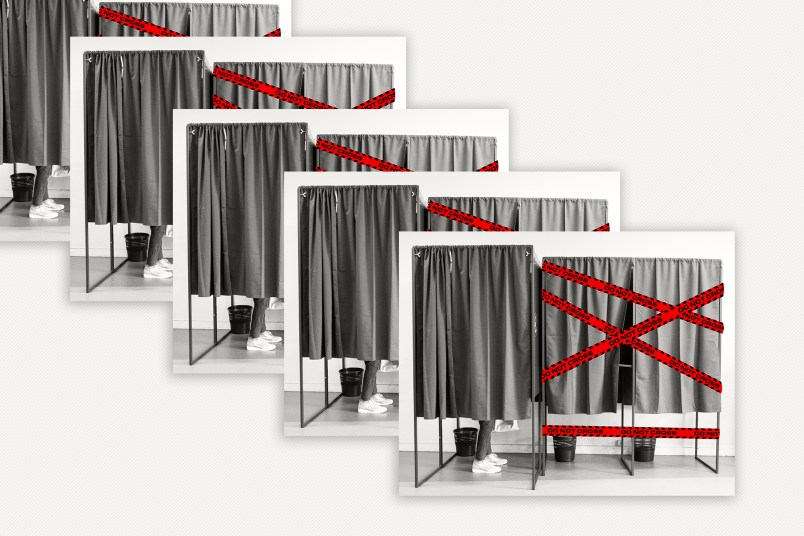Arkansas Attorney General Tim Griffin, a Republican, announced this week that he was launching an Election Integrity Unit to investigate nonexistent widespread voter fraud in the state. He’s not the first red-state Republican to push such a voter suppression tactic in recent months, and he likely won’t be the last.
The attorney general said on Monday that the unit would be created under his office’s Special Investigations Division, with the chief of investigations serving as its director. The initiative comes almost a year after Florida launched its Office of Election Crimes and Security and Georgia allocated nearly $580,000 to its Bureau of Investigation to look into supposed election crimes. Republican lawmakers in Missouri and Ohio have introduced legislation in their statehouses to try to create similar units.
To be clear, there’s little evidence of widespread fraud anywhere in the U.S., let alone these states.
“Given that fact,” Nicholas Stephanopoulos, an election law professor at Harvard Law School, said, “these ridiculous police forces are more solutions in search of a nonexistent problem.”
These copycat units began sprouting up in red states after Florida Gov. Ron DeSantis (R) launched his election crimes task force last year. While the Florida unit was successful in creating headlines last summer when it announced the arrests of 20 formerly incarcerated residents for alleged illegal voting—mostly Black and mostly south Florida residents who didn’t know they couldn’t vote—the unit, at least thus far, has netted few prosecutions. Only one case has gone to trial, while several others went nowhere. Still, the governor wants to expand the office and more than double its budget.
Experts who spoke to TPM said the trend is revealing of Republicans’ ongoing voter suppression strategy and efforts to keep the Big Lie alive and well heading into 2024.
“This trend is inspired by the conspiracy theories and false narratives from the 2020 election of voter fraud,” Matthew Seligman, a D.C.-based election lawyer, told TPM. “This builds on a long-term set of beliefs in the Republican Party among conservatives that voter fraud is a common major problem and changes the outcomes of elections.”
“All of these units are effectively grabbing onto the coattails of the Big Lie to justify their existence,” Eliza Sweren-Becker, a counsel at the Brennan Center for Justice’s Democracy program said.
The real problem is that the task forces will still have to arrest someone, even if they didn’t realize they broke election rules, Seligman said. “And so they’re going to end up looking at people who are engaged in innocent behavior.”
“What we saw in Florida is that what the office came up with great fanfare at a press conference was actually just the prosecution of returning citizens who made honest mistakes thinking that they were eligible to vote,” Sweren-Becker, said, “which is, as I said, a mistake, not a crime.”
While the offices may not come up with many arrests, they can still have an impact on the voter turnout. Formerly incarcerated citizens in Florida have already expressed fear around voting—even though most of them are eligible—because they don’t want to get arrested.
“I think the very existence of these units has the effect of furthering distrust in our election system,” Sweren-Becker said, “and intimidating people who are concerned about getting caught up in the criminal legal system, just by virtue of mere misunderstanding.”







Someday this will all come crashing down and I hope it’s soon.
I think that may be the point.
Once again, the GQP can’t win elections fairly (in many places), so they lie, cheat, and steal. And immediately turn around and accuse their opponents of the very same behavior. It’s sickening, it’s old, and it’s time it stopped.
Cruelty is/was always the point.
I can’t believe that there isn’t state specific data about numbers of newly registered voters, numbers of newly dead registered voters voting, and how many votes they cast? My greatest fear is that this movement in states will create an opportunity for someone to challenge a bunch of folks voter registration, and the person whose registration is challenged won’t know about it until an election day.
Also can’t wait for the cost analysis of how much money was spent to uncover one or two people voting illegally, or in error. Seems rather fiscally irresponsible to me.
And all the while, rightists are cutting ties with ERIC, the multi state compact system that would catch Republicans illegally voting at their vacation properties.
I guarantee nobody who waited 7 hours to vote in Milwaukee or Atlanta, even has the option to declare “residency” anywhere else.